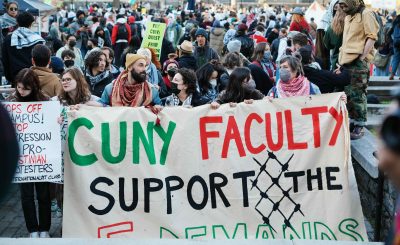By: Camila Tabares. Have you noticed a rise in your grocery bill lately? Is your budget for food shrinking, yet your spending’s continue to climb? Inflation is taking a toll on everyone’s wallets as prices at the checkout line soar. College students are often a vulnerable demographic when it comes to financial stability. With prices rising the situation has become even more dire as food insecurity grows more prevalent. This issue is particularly noticeable among low-income students, compounded by high tuition costs, inadequate financial aid and a weak job market.
While rising food prices are a global issue, New Yorkers are particularly feeling the impact as it drives up the already high cost of living. A poll commissioned by No Kid Hungry New York, a nonprofit national campaign that focuses on hunger and poverty, indicates that 85% of residents believe food prices are rising faster than their income. As a result, nearly four in five households reported greater difficulty affording groceries over the past 12 months. If this is the reality for the majority of families in New York, consider the challenges faced by vulnerable students who are struggling to balance school and work. According to College Students and SNAP: The New Face of Food Insecurity in the United States, over the past decade, numerous studies on food insecurity among college students have revealed alarming rates ranging from 20% to over 50%. These figures are significantly higher than the national average of 12% for the overall U.S population. These statistics highlight a growing concern within higher educational institutions.
QCC students are no exception to this growing financial strain. A survey conducted with 50 students revealed that 43 of them find grocery shopping to be a stressful experience. For Sarah, 19, the cost of living in Queens is a great concern. “I make $1000 every two weeks, and it’s simply not enough. My mom left me in charge of my little sister over a year ago and the expenses are out of this world. Me and my sister Sam spend over $500 on groceries every month.” Sarah provided a breakdown of her expenses, and every month she is able to save $200 out of the $2000 she makes.
Robert, 23, has a similar experience. He is a full time student and a full-time soccer coach. His job pays him off the books but he is still affected by the inflation crisis. “I have child support to worry about. I have to give my baby’s mom a good amount of my paycheck, and with food going up every day, I can feel my pockets crying”.
David, 20, is another student who decided to share his struggles. He mentions that since starting college his parents made him get a job. He has to give them $100 each week to help with food expenses. He mentions he only works 20 hours a week and is paid $16 hourly, asking him to provide $400 a month is a lot. “My parents can’t work as much as they used to, my mom has a bad knee and my dad is pretty old so it’s tough for them. We’re also a family of seven, there are a lot of mouths waiting to be fed”. David decided to ask his parents for an estimate on their food expenses, and it’s around $4,000 a month.
Listening to the daily struggles QCC students faced brings great awareness to the global food insecurity crisis. As a student, it’s important to remember that you are not alone. While it may take years for the government to stabilize food prices, QCC is here to offer support. The college provides a Food Pantry, located on the first floor of the Administration Building, ready to assist students in need. For further information, see the Communiqué’s “Our Food Pantry in QCC” or visit their homepage.



